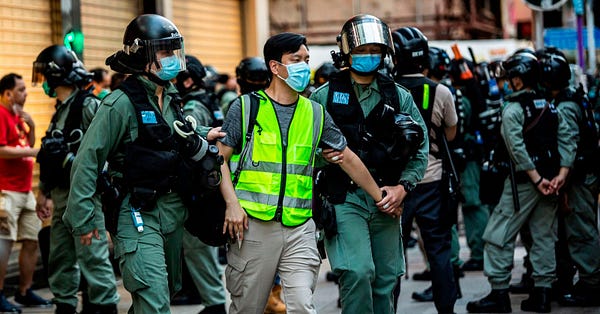The app that defines 2020


TikTok has turned out to be the most prominent symbol of Beijing’s battles with the world, now that it’s been banned by India along with other apps from China, and faces possible similar sanction from the U.S. The company behind the app says it has never shared data with the Chinese government, and will exit Hong Kong to avoid doing so.


The list of firms worried about China’s new security law in Hong Kong has grown to include most of the biggest names in technology, which are used in everyday life. After all, the legislation means police can request insider information about anyone they suspect as seditious. What they uncover could result in a life sentence.
No more songs of glory
The reach of the new security law extends beyond the internet, as schools in Hong Kong are no longer allowed to teach the unofficial anthem of the pro-democracy movement. The song “Glory to Hong Kong” was singled out amid the removal of activists’ books from public libraries and banners with a popular protest slogan.


Help us grow! We’re reaching more and more people in 2020 because people are hungry for uncensored news. Click to share! 👇
Confessed against laws


British broadcast regulator Ofcom ruled that the China Global Television Network was out of bounds when it aired forced confessions, and the state-owned English-language channel may be banned from the U.K. as a result. Similar content has been telecast in Canada, but its regulator hasn’t acted on complaints regarding these legal breaches.


The latest detainee to get international attention was taken away after publishing an essay critical of how China handled the initial outbreak of COVID-19. Law professor Xu Zhangrun had previously been critical of Xi Jinping’s leadership style—and had a bag with clothes and a toothbrush readied for this reason, while he was under house arrest.
Tensions with Australia


Australia’s government told its citizens they’re at risk of arbitrary detention if they travel to China, in response to Beijing accusing the country of mass espionage. (China’s embassy called the action ridiculous.) And then it took another step:


The last words, for now
Papi Jiang became the internet queen of China thanks to sarcastic comedy videos that made her the kind of star who gets an article in the New York Times. As a result, the recent birth of her son drew wider attention for the fact that the baby was given her husband’s surname, a decision which gave feminist social media fodder for debate:


The China Letter will return next week. If you’re not subscribed yet, do it here:





